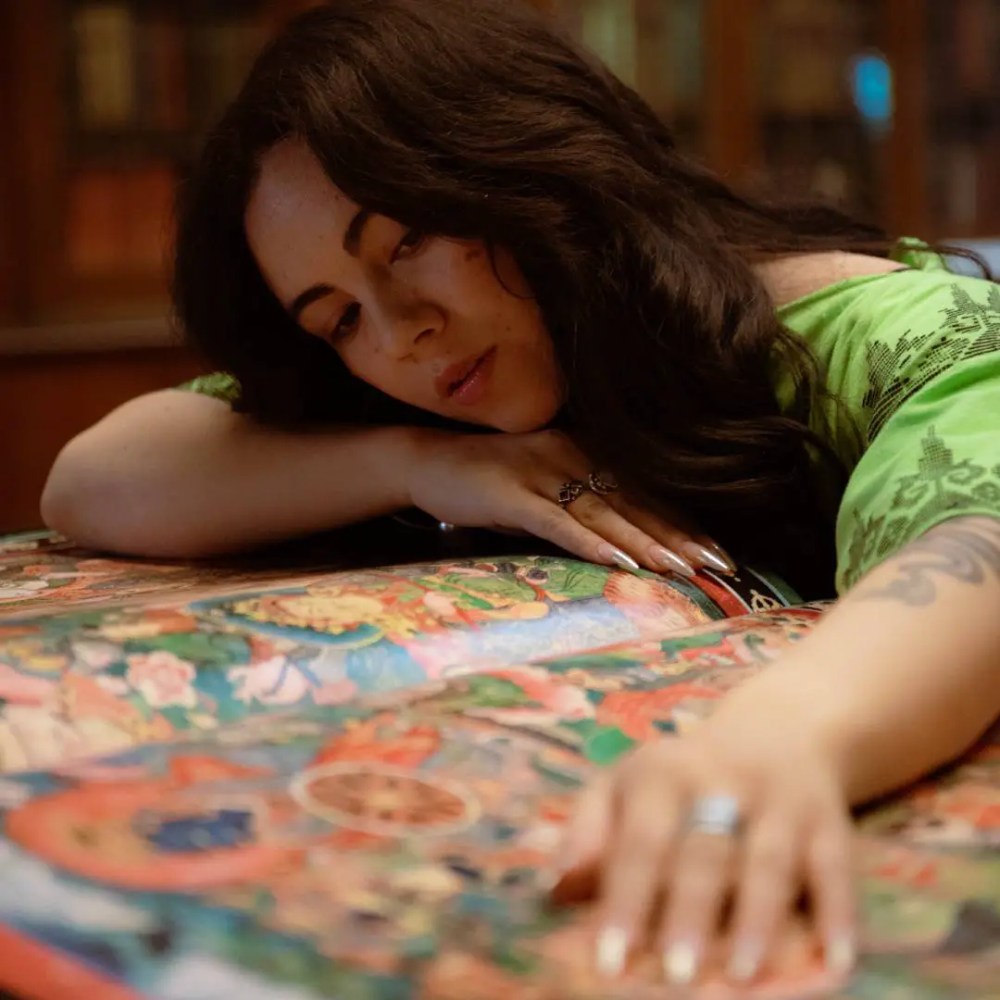Image via Rachel Kupfer
At the Philosophical Research Society, Micaela Tobin’s voice resonates like subatomic particles bouncing around an atom. Inside this wooden library, she sings operatic warm ups and each intonation vibrates with tactile intensity, somehow altering my cell’s microscopic make-up and leaving something permanently changed. Her sweeping vocals belie a down-to-earth demeanor. She regularly laughs throughout our far-reaching, fittingly philosophic interview. Over the course of an hour, we dig into precolonial Filipino myths, music as praxis, and artistic decolonization, but let’s briefly rewind.
Raised in Pasadena, California, Tobin found her voice early from singing lessons in elementary school. While her teacher prescribed her run-of-the-mill pop songs, Tobin’s range had already transcended radio and Disney singalongs . This rapid evolution led her to practicing the quintessential Italian art song “Caro Mio Ben,” a moment that would mark the discovery of the careening range and resonance belting from a child yet to be 10. She would go on to study at the Los Angeles County High School for the Arts (LACHSA) and UCLA for training in opera performance, but the formality of the craft would eventually wear thin. Rejecting a lifetime of work, Tobin packed her things with her drone rock band and moved to Seattle, diving deeper into the noise world.
As it was, her passion for opera would eventually return and bring Tobin back home. In Southern California, she found the ability to bridge her two artistic callings, gaining a following within the experimental arts scene as the musician imbuing classic soprano stylings with brutalizing walls of sound. Her journey would unfold even further while attending a performance by fellow Filipino artist Anna Luisa Petrisko in the mid-10s. It was there that she heard a deconstructed Filipino lullaby, marking the first time her culture had been reflected back to her on stage.
Inspired to investigate precolonial Filipino culture after this continental shift in perspective, her work became even more nuanced and eventually caught the attention of independent experimental label Deathbomb Arc in 2020. Situated within a global collective of transgressive sound practitioners, she was now naturally pulling from the sonic palate of Merzbow as much as she was from Italian opera vocalists and mythical internet archives. With this inimitable mixture, Tobin had synthesized the inspiration of artists like Petrisko into a practice wholly her own.
In November of 2022, Tobin was tapped by the Philosophical Research Society (the PRS) for a career-spanning talk in their storied lecture hall. Sacred wisdom floated towards the seekers gathered in the auditorium. They echoed what Tobin first channeled into music. She sets the stage for her lecture with a meditative, sound-looping session. With the audience’s guard lowered, she tactfully detailed her experimental ethos which infused traditional opera vocals with deafening harsh noise.
As one might imagine from aforementioned descriptions, Tobin’s sonic framework is a transgressive landscape that makes space for her exploration of precolonial Filipino myths. Those myths — heavily emphasized throughout her lecture — are a key sequence in the DNA of her critically-acclaimed 2020 album BAKUNAWA (via Deathbomb Arc) and 2021 film BAKUNAWA: OPERA OF THE SEVEN MOONS. The two are an intrinsically tied pair of projects anchored by the moon-eating serpent of lore. During her lecture, Tobin revealed that another archetype — Apolaki, the god of sun and war — will function as the foundation for her forthcoming 2023 project: Apolaki: Opera of the Scorched Earth.
The work from Apolaki that Tobin has debuted live has been a brilliant showcase in the evolution of her art. At times more beautiful, at times more abrasive, it pushes her alchemized sound to its absolute limits. Her performances have been particularly engulfed by the viscerality of the in-progress opera. They’ve also deepened her artistic reverence for ancestry and familial bonds as recent shows have even included appearances from relatives. With moments like her mother reading a poem in Tagalog, Tobin has continued to examine the precolonial Filipino spirit that the Apolaki embodies. It’s the type of intellectual investigation that makes her catalog so spellbinding and the promise of Apolaki so great.
With the debut of material from Apolaki fresh on the brain, Tobin returned to the PRS in January of 2023. There, we opened up the institution’s heavy wooden doors for a captivating conversation that zig-zags across the map of the Western musical canon, Pacific Northwest noise, and Filipino culture’s resilience in the face of colonization. – Mike Giegerich

